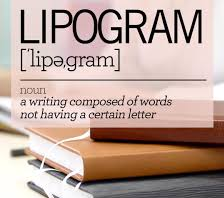A lipogram is a type of writing or literary work in which the author deliberately avoids using a particular letter or group of letters throughout the entire text.
The goal of a lipogram is to demonstrate linguistic skill and creativity by crafting a coherent and meaningful piece of writing while adhering to this self-imposed constraint.
For example, a well-known lipogrammatic novel is "La Disparition" (A Void) by Georges Perec, which is written entirely without using the letter "e," the most frequently used letter in the French language. This type of constrained writing can be a challenging exercise for authors, requiring careful attention to language and vocabulary choices. Lipograms are often used as a form of literary experimentation and can result in unique and intriguing works of literature.
Here are some examples of lipograms, along with the specific letters they avoid:
1. "La Disparition" (A Void) by Georges Perec:
- This novel is written entirely without the use of the letter "e," which is the most frequently used letter in the French language.
2. "Eunoia" by Christian Bök:
- In this book of poetry, each chapter is dedicated to a single vowel, and the chapter uses only words that contain that particular vowel.
3. "A Void" (Translation of "La Disparition") by Gilbert Adair:
- Gilbert Adair translated Georges Perec's "La Disparition" into English while maintaining the constraint of avoiding the letter "e."
4. "Gadsby" by Ernest Vincent Wright:
- This novel, published in 1939, is written without using the letter "e." It's a notable example of a lipogram in English.
5. "Alphabetical Africa" by Walter Abish:
- In this experimental novel, each chapter allows the use of only one letter of the alphabet, with chapters progressing in alphabetical order.
6. "Ella Minnow Pea" by Mark Dunn:
- This epistolary novel tells the story of a society where certain letters are progressively banned. The novel adheres to this constraint.
These examples demonstrate the creativity and linguistic skill required to write within the constraints of a lipogram. Each work showcases the author's ability to construct coherent narratives or poetry while deliberately avoiding specific letters or groups of letters.
A paragraph without the letter A
Well theoretically, I could. It wouldn’t be effortless, but I guess it’s not impossible either. You just need to think things through slowly. I think. Keep your sentences simple. This is getting more difficult to be honest. I find myself restricted to using some select prepositions; these sentences will become quite unwieldy in no time. Oh God. I might be in trouble. I didn’t comprehend how much I needed this bloody letter until now. It’s tricky to write, or even converse without this letter. I hope I don’t run out of synonyms. Convolution seems to be the only option here. This restriction might induce some fits in me. I curse, this is becoming torture of the highest order. Closer or further in the fourth dimension I will encounter words which possess no synonyms, or be forced to expressions which, put together, give English tutors immense pain in the noggin. This might be one of those. I offer my condolences. How long more need I write for this to be done? Is it - is it done? Yes? Phew. I’m out.
That was really difficult. On Jesus, I miss my As. I don’t know how people do it. I couldn’t use a. Couldn’t use an. couldn’t use that.
I tried to keep my sentences grammatical, but it’s hard to do that when you cannot have, you cannot make, and you cannot even can.
I feel linguistically crippled. I tried to write this without a thesaurus; I must say the thesaurus won.
I’m done.
A paragraph without the letter E
I doubt I can. It’s a major part of many, many words. Omitting it is as hard as making muffins without flour. It’s as hard as spitting without saliva, napping without a pillow, driving a train without tracks, sailing to Russia without a boat, washing your hands without soap, or shitting without a butt. And, anyway, what would I gain? An award? A cash bonus? Bragging rights? Why should I strain my brain? It’s not worth doing. Now, a grammatical paragraph without commas: that would wow most folks on Quora, don’t you think? Could you do it? If so, I tip my hat to you—or I would if I had a hat. Or, how about a paragraph without punctuation? Or a paragraph without nouns? If you can do that, you’ll win my admiration. Go on. Try! I’m waiting…
A paragraph without the letter "E":
"In a dim, distant land, far from city lights, stars twinklily in a midnight sky. Crisp winds rustlily through tall piny trunks. Occasional hoots from owls add to nocturnal symphony. This tranquil night, devoid of city clamor, brings calm and solac."
A paragraph without the letter "I":
"Beneath a vast sky, aves (birds) soar beyond the sky, through dance and ballet. Lush green farm lands (fields ) stretch out, upon harmony along (with) the breeze (wind). Laughter and joy enclosed (fill) the breeze (air) as toddlers (children) play games, shadows the aves. A deep far (distant) stream (river) flows smoothly (steadily), the waters glows (glistening) under the sun's rays (sunlight). Tall mountains stand robust (majestically) amongst (in) the boundary (horizon), the mountain's peaks touch the clouds. Nature's beauty surrounds us, presents a peaceful sanctuary for all."
A paragraph without the letter "O":
"In a quaint, quiet village, nestled amidst majestic hills, a gentle breeze whispers within (through) tall grasses. Birds chirp merrily in the trees, filling the air with their cheerful lyrics (songs). The scented buds (flowers ) drifts on the wind, perfuming the surroundings. Children play games in the meadow, their laughter echoing through the countryside. The sun sets, painting the sky in warm hues, casting long shadows across the landscape. It's a tranquil scene, inviting all who pass by to pause and savor the serenity."


No comments:
Post a Comment